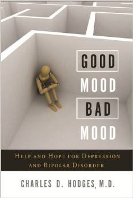The topic of this book is not likely on the usual reading list of the average pastor, but this book appears to be one that deserves the exception. A graduate of the Indiana University School of Medicine, Liberty University and Liberty Baptist Theological Seminary, the author, Dr. Charles Hodges, Jr., is a practicing physician, a licensed marital family therapist, and a biblical counselor with considerable research in and experience dealing with this problem that pastors are facing with increasing frequency.
Whatever you may think of them, such things as depression and bipolar disorder are here, and pastors rightly feel pressured to learn something about them. Yet the frustration has been to find a reliable examination of these “diseases” and their respective treatments by someone who has a close understanding them. Dr. Hodges has written Good Mood Bad Mood: Help and Hope for Depression and Bipolar Disorder to fill this need for any who must face these issues at whatever level. Today, he is here to talk to us about his work.
 Books At a Glance (Fred Zaspel):
Books At a Glance (Fred Zaspel):
It would be helpful to begin with some definitions. First, just what is bipolar disorder?
Hodges:
First I would like to thank Books at a Glance for the opportunity to talk about Good Mood Bad Mood.
Bipolar disorder is part of the category of Mood Disorders found in the Diagnostic Statistical Manual of Mental Disorders known as the DSM. The DSM has a list of symptoms that a person must have in order to receive the diagnosis. Bipolar disorder used to be called manic depression but in 1980 the name was changed and several categories of bipolar disorder were created.
Basically, bipolar disorder is a group of symptoms and behaviors. In the initial phase the individual my struggle with sleeplessness, an inability to stay focused on any one thing, and grandiose thinking. They may believe that they have business ability and money that they do not have. They are known to spend large amounts of money, and attempt to involve themselves in business deals that seem like a sure them to them but make no sense to others. They have pressured speech, delusional thinking, and may become disconnected from reality.
Once the initial phase passes, a period of profound depression may follow.
There are other categories of bipolar disorder. The most commonly diagnosed category is bipolar disorder 2. It does not involve the problems of mania. It generally involves an individual who struggles with depression who will have periods that last 4 to 7 days during which they have a better than normal attitude, are more goal directed at work, and need less sleep but sleeping 4 hours or more. These periods are called hypomania because they represent a change but do not reach the level of mania.
Bipolar Disorder currently is a clinical diagnosis. There are no blood tests or brain scans that can be done that will make the diagnosis, confirm it or deny it.
Books At a Glance:
What is depression? And could you explain the distinction you make between depression and sadness?
Hodges:
Depression is another mood disorder in which an individual develops a sad mood, loses interest in things that he or she enjoyed. The individual may have problems with sleep, have changes in appetite, lose interest in sex, and struggle with work. He or she may suffer with guilt, and have suicidal thinking. These problems must last for at least 2 weeks.
The diagnosis of depression is made by comparing the behavior and thinking of the sufferer to the criteria found in the DSM5. It is strictly made on the basis of the opinion which makes it subjective. There are no objective findings on physical exam, laboratory testing, x-rays or brain scanning that can make or confirm the diagnosis of depression.
Prior to 1980, the diagnosis of depression was only made in people who could not tell us why they were sad. A patient who could tell us what had happened in life to make them sad was not considered to have major depression. Instead they were considered to have normal sadness or grieving over loss. Those who could not tell us why they we sad were considered to have disordered sadness and were diagnosed with depression. With the revision of the DSM3 in1980 the distinction between normal sadness and disorder sadness or depression has been blurred. So much so that people rarely say they are sad, they generally say they are depressed.
 Books At a Glance:
Books At a Glance:
Can you explain for us briefly the problem in diagnosing depression and classifying it as a disease?
Hodges:
The change of the criteria for making the diagnosis of depression with the 1980 revision made it easier to make a diagnosis of depression. Now people who are grieving a significant loss in life can be diagnosed as depressed after two weeks. This has increased the number of people diagnosed with depression dramatically.
The problem with diagnosing depression and classifying it as a disease centers on the fact that we do not know what the pathological cause of disordered sadness. Pathology is a change in the human cell structure that results in a change in the way the body functions resulting in disease. We currently do not know what those changes are that result in sadness without cause.
Books At a Glance:
It has become commonplace to acknowledge that some depressions are caused by a chemical imbalance of some kind, yet this is something you challenge rather forcefully in your book. Could you explain this issue for us?
Hodges:
The reason why I challenge the theory that all depression is caused by a chemical imbalance is that in 50 years of looking we have not been able to find one. Dr. Thomas Insel at the National Institute of Mental Health said as much in May of 2012. The chemical imbalance theory does not fit well with what we see in practice. Medication used in the United States is supposed to raise the level of serotonin to correct the imbalance. These medications do not work very well according to current research. Medication used in France that works as well as the medication available in the US is supposed to lower the level of serotonin. Recent research published in JAMA in 2010 said that 87% of people who take these medications do not benefit any more from them than those who take a placebo pill (a pill that looks like but does not contain the active drug). I deal with this at length in the book.
Books At a Glance:
Is there any case where depression may be caused by a chemical imbalance of some kind? And if so, can you tell us, even if just generally, how to distinguish normal sadness from a kind of depression that would actually benefit from medical treatment?
Hodges:
There are many diseases that result in an imbalance in hormones and that can be accompanied by a depressed mood. Cushing’s disease, thyroid disease, cancer of the pancreas, and lupus can result in a depressed mood to name a few. I think though …
Note: We will continue our interview with Dr. Hodges here tomorrow.

